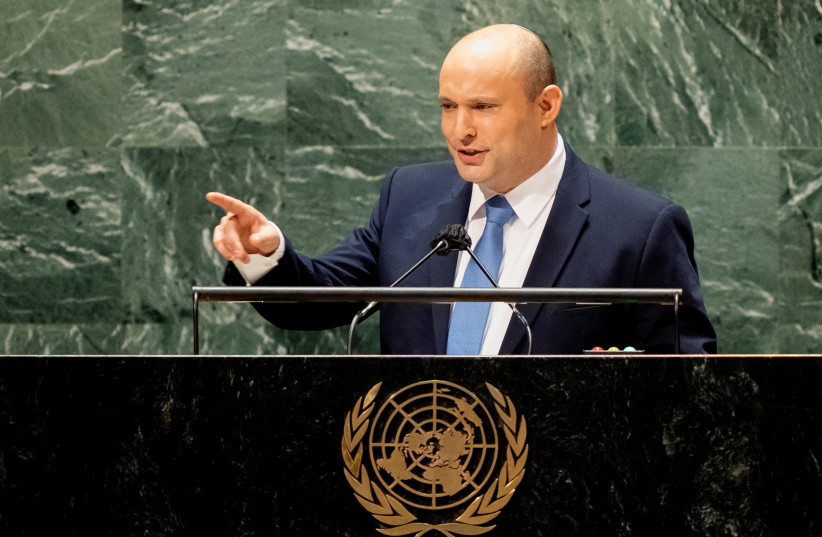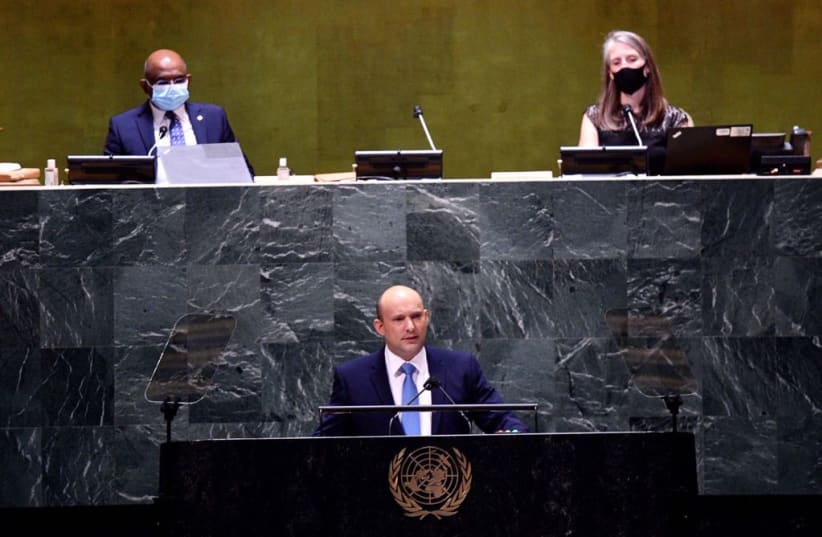Much attention has been paid to Prime Minister Naftali Bennett not mentioning the Palestinians in his speech at the UN General Assembly this week. But there is another topic that loomed large on the UN agenda that Bennett skipped: climate change, a major topic of discussion lately at the UN, and featured in many of the leaders’ addresses.
Perhaps the comment that received the most notice at the 76th UNGA this month was from British Prime Minister Boris Johnson, who challenged a Muppet.
“When Kermit the Frog sang, ‘It’s Not Easy Bein’ Green,’ I want you to know he was wrong – and he was also unnecessarily rude to Miss Piggy,” he said.
Johnson’s speech, several days before Bennett’s, was entirely focused on climate. He called on humanity to “grow up” and take “responsibility for the destruction we are inflicting, not just upon our planet but upon ourselves.”
Johnson’s UK will be presiding over the UN Climate Change Conference at the end of the month in Glasgow.
Over 100 world leaders, including US President Joe Biden, have said they would attend, but Bennett is not one of them. He has yet to decide, his spokesman said on Thursday.
Environmental Protection Minister Tamar Zandberg does plan to go to Glasgow. But not sending Israel’s leader would send a message about where climate stands in Israel’s priorities, putting Israel in stark contrast with most Western democracies these days.
And that message would be honest. Climate is not at the top of the agenda in Israel, neither for the government nor for the media, not even for the general population as polling indicates, even though we are located in a climate hotspot, where we may fall victim to some of the worst effects.


AT SOME level, Bennett seems to recognize that climate is an important issue, and has made several public statements about climate change.
Last week his office distributed a summary of what the new government did in its first 100 days, including “combating climate change” as one of its top items. He mentioned it in his public statement with US Secretary of State Antony Blinken in Washington last month.
A senior diplomatic source this week said Bennett is “very mindful” of climate change.
But the topic didn’t come up in the UNGA speech because Israel is “a small country with a small footprint. Even if we do everything we need to, we won’t have much of an influence on the global footprint,” the source said.
At the same time, Israel “can use our great abilities in innovation, start-ups and water technology to help,” the source said.
But Israel is not just “a small country with a small footprint” when it comes to climate. It’s the same with corona and social-media-driven political polarization, as well. Yet Bennett chose to mention those in his speech.
His frankly weak argument – that Israeli innovations on that front can be an example for the world – is much more applicable to climate. That indicates that Bennett may have been thinking more about domestic consumption of his speech, which means that climate is less of a topic of interest.
Bennett does have other priorities, such as having to grapple with the pandemic like everyone else – Australian Prime Minister Scott Morrison said this week that he may skip Glasgow because of it – and dealing with the threats Israel constantly faces.
“We are in the toughest neighborhood in the world,” Bennett said at an event this week with Jewish community organization leaders hours after his UN speech, adding that in his conversations as prime minister, he found that “leaders of other countries just don’t get it.”
However, climate change is still happening, regardless of whether Hamas is shooting rockets and Iran is developing a nuclear weapon.
Bennett just needs to look at some of the people working closely with him to tell him that.
ZANDBERG CALLED in August for Israel to declare a “climate emergency. We must define the climate crisis as a strategic threat, which all parties need to prepare for and deal with better, because from now on it’s going to get worse and worse. There is something to be done, and it needs to be done now.”
Defense Minister Benny Gantz wrote in the introduction to a symposium on “Environment, Climate and National Security” for the Institute for National Security Studies in February: “Israel, which is expected to be one of the countries in which climate change is accelerated, must prepare.
“We tend to think that because of the many threats Israel faces, dealing with the topic of climate, as is done in Europe, for example, is a kind of a ‘luxury’ for us. We also think that our influence, as a small country... is very limited. That is too narrow a view because the influences of climate change are not waiting for us to solve all of our problems with our neighbors.”
Soon-to-be ambassador to the US Michael Herzog told the Times of Israel earlier this year: “Our region is highly unstable in geopolitical terms, and if you add on top of it that it’s a hotspot for climate change, it becomes a threat multiplier. This must be integrated into Israel’s national security doctrine. Climate change is a faceless enemy that knows no borders, and building fences will not be enough. We need regional cooperation.”
Just as ignoring the Palestinians and their impact on Israel’s national security and future will not make them go away, ignoring climate change will not alter that it is indeed here, and is a major threat that must be addressed.
